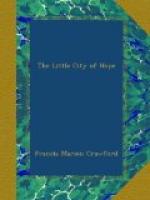Newton stared at the engine that was a failure. It looked as if it ought to work, he thought, with its neat cylinders, its polished levers, its beautifully designed gear. It stood under a big case made of thick glass plates set in an iron frame with a solid top; a chain ran through two cast-iron wheels overhead to a counterpoise in the corner, by which device it was easily raised and lowered. The Motor was a very expensive affair, and had to be carefully protected from dust and all injury, though it was worth nothing at present except for old brass and iron, unless the new part could be made.
“Come, my boy, let’s think of something more cheerful!” Overholt said, making an effort to rouse himself and concentrated his attention on the paper model. “Christmas is coming in three weeks, you know, and it will come just the same in the little City. I’m sure the people will decorate their houses and the church. Of course we cannot see the insides of the houses, but in Boston they put wreaths in the windows. And we’ll have a snowstorm, just as we used to have, and we can clear it away afterwards! Wasn’t there a holly tree somewhere near the College? You haven’t put that in yet. You have no idea how cheerful it will look! To-morrow we’ll find a very small sprig with berries on it, and plant it just in the right place. I’m sure you remember where it stood.”
“Real leaves would be too big,” observed the boy. “They wouldn’t look right. Of course, one could cut the branches out of tin and paint ’em green with red spots, and stick them into a twig for the trunk. But it’s rather hard to do.”
“Let’s try,” said Overholt. “I’ve got some fine chisels and some very thin brass, but I don’t think I could draw the branches as well as you could.”
“Oh, I can draw them something like, if you’ll only cut ’em out,” the boy answered cheerfully. “Come on, father! Who says we can’t make bricks without straw? I’ll bet anything we can!”
So they worked together steadily, and for an hour or two the inventor was so busy in cutting out tiny branches of imaginary holly with a very small chisel that he did not look once at the plate glass from which his engine seemed to be grinning at him, in fiendish delight over his misfortunes. There were times when he was angry with it, outright, as if it knew what he was doing and did not mean to give in to him and let itself be invented.
But now the tune of the lathe and the chisel still ran on in his head, for he had heard it through two whole days and could not get rid of it.
“Bricks without straw, bricks without straw!” repeated the lathe viciously. “Ever so much better than no bricks at all, sh—sh—sh!” answered the chisel, gibbering and hissing like an idiot.
“You will certainly be lying on straw before long, and then I suppose you’ll wish you had something else!” squeaked the little chisel with which he was cutting out holly leaves, as it went through the thin plates into the wood of the bench under each push of his hand.




